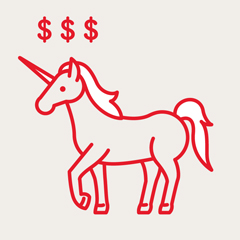In European folklore, the unicorn is a beast of legend. But now, investors use the word to describe companies that attain a “legendary” $1-billion market valuation before they are 10 years old.
These business unicorns – so named because they are exceedingly rare – comprise 39 software companies established since 2003. Facebook, Twitter and YouTube are among the best known.
Nico Lacetera, a professor at the Institute for Management and Innovation at U of T Mississauga, says it’s hard to predict which companies will become the next unicorns because they make up such a tiny fraction of all startups – less than one tenth of one per cent. But their success derives from a common source, he says: most have harnessed the Internet to quickly build massive audiences for their products or services.
It remains to be seen what longterm impact unicorns have on the business ecosystem. Most are not yet as profitable as long-time corporate workhorses such as Microsoft, which in 2013 out-earned Facebook by more than 10 to 1.
Recent Posts
U of T’s Feminist Sports Club Is Here to Bend the Rules
The group invites non-athletes to try their hand at games like dodgeball and basketball in a fun – and distinctly supportive – atmosphere
From Mental Health Studies to Michelin Guide
U of T Scarborough alum Ambica Jain’s unexpected path to restaurant success
A Blueprint for Global Prosperity
Researchers across U of T are banding together to help the United Nations meet its 17 sustainable development goals






